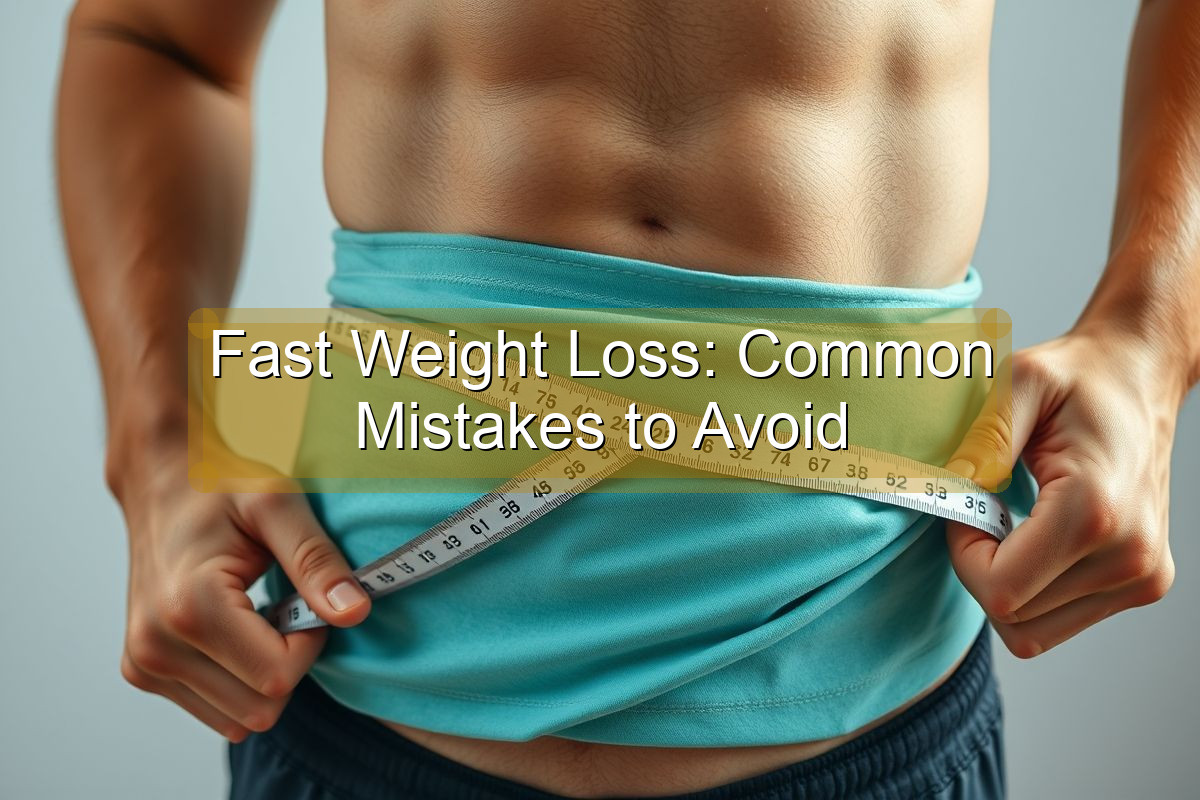

<meta name=”description” content=”Learn about common mistakes to avoid when trying to achieve fast weight loss. Discover healthy strategies for sustainable results.”>
The Pitfalls of Rushing: Fast Weight Loss and How to Do It Right
In a world obsessed with instant gratification, the desire for fast weight loss is understandable. We’re bombarded with images of “quick fixes” and promises of shedding pounds in record time. However, the reality is that rapid weight loss is often unsustainable and can even be detrimental to your health. While the appeal of fitting into that dress or feeling confident for an upcoming event is strong, it’s crucial to approach weight loss with a balanced and informed perspective. This article aims to guide you through the common mistakes people make when pursuing fast weight loss and provide strategies for achieving sustainable and healthy results.
The pursuit of fast weight loss can lead individuals down a path of restrictive diets, excessive exercise, and potentially harmful supplements. Before embarking on any weight loss journey, it’s essential to understand the potential risks and long-term implications of these drastic measures. Remember, your health and well-being should always be the top priority. This guide will highlight the importance of making informed decisions, consulting with healthcare professionals, and adopting a holistic approach that encompasses not only diet and exercise but also mental and emotional well-being.
The key to successful and sustainable weight loss lies in understanding your body, setting realistic goals, and making gradual, positive changes to your lifestyle. Avoid the allure of overnight transformations and focus instead on building healthy habits that will support your long-term health and happiness. This is not just about losing weight; it’s about gaining a healthier and more vibrant life.
Common Mistakes to Avoid When Trying to Achieve Fast Weight Loss
1. Severely Restricting Calories
The Dangers of Crash Dieting
One of the most common and detrimental mistakes people make when attempting fast weight loss is severely restricting their calorie intake. Crash diets, often involving consuming less than 1200 calories per day, can lead to a host of negative consequences. While you might see a rapid drop on the scale initially, this is often due to water loss and muscle mass reduction rather than actual fat loss. This can damage your metabolism in the long run.
When you drastically cut calories, your body enters “starvation mode.” This means your metabolism slows down to conserve energy, making it even harder to lose weight in the future. Additionally, severe calorie restriction can lead to nutrient deficiencies, fatigue, irritability, and even more serious health problems like gallstones and electrolyte imbalances. It is not sustainable.
Instead of drastically cutting calories, focus on making gradual and sustainable changes to your diet. Aim for a moderate calorie deficit of 500-750 calories per day, which is generally considered safe and effective for weight loss. Prioritize whole, unprocessed foods like fruits, vegetables, lean proteins, and whole grains, and avoid sugary drinks, processed snacks, and excessive amounts of unhealthy fats. Consider speaking with a registered dietician to determine the right caloric intake for you.
Ignoring Nutrient Needs
When focusing solely on calorie restriction, it’s easy to overlook the importance of getting adequate nutrients. Your body needs a variety of vitamins, minerals, and macronutrients (protein, carbohydrates, and fats) to function properly. Crash diets often lack essential nutrients, leading to deficiencies that can impact your health and well-being.
For example, inadequate protein intake can lead to muscle loss, which further slows down your metabolism. Insufficient intake of essential fatty acids can affect hormone production and brain function. And deficiencies in vitamins and minerals can cause fatigue, weakened immunity, and other health problems. It’s important to focus on nutrient-dense foods.
To ensure you’re meeting your nutrient needs, prioritize a balanced diet that includes a variety of foods from all food groups. Consider taking a multivitamin or mineral supplement to fill in any gaps in your diet. Consult with a healthcare professional to determine if you have any specific nutrient deficiencies and to get personalized recommendations for supplementation.
2. Overdoing Cardio and Neglecting Strength Training
The Myth of Cardio as the Only Solution
Many people believe that endless hours of cardio are the key to fast weight loss. While cardio is undoubtedly beneficial for cardiovascular health and can burn calories, it’s not the only piece of the puzzle. Overdoing cardio can actually be counterproductive, leading to muscle loss, increased stress hormones, and burnout.
When you engage in excessive cardio, your body starts to break down muscle tissue for energy. This is especially true if you’re not consuming enough protein. Muscle is metabolically active tissue, meaning it burns more calories at rest than fat. Losing muscle mass slows down your metabolism, making it harder to lose weight in the long run. In addition, too much cardio may lead to burnout.
Aim for a balanced approach that includes both cardio and strength training. Incorporate moderate-intensity cardio activities like brisk walking, jogging, or cycling for at least 150 minutes per week. Also, it is important to not only do cardio. Strength training is equally or more important for long term success.
The Importance of Building Muscle
Strength training is often overlooked in the pursuit of fast weight loss, but it’s actually a crucial component of a successful weight loss strategy. Building muscle mass not only increases your metabolism but also improves your body composition and overall health. Strength training increases your metabolism.
As mentioned earlier, muscle burns more calories at rest than fat. By increasing your muscle mass, you’ll be able to burn more calories throughout the day, even when you’re not exercising. Strength training also helps improve your insulin sensitivity, which can help regulate blood sugar levels and prevent weight gain. If you are looking for long term success, strength training is the way to go.
Aim to incorporate strength training exercises that target all major muscle groups (legs, back, chest, shoulders, arms, and core) at least two to three times per week. Use weights that are challenging but allow you to maintain proper form. Consider working with a certified personal trainer to learn proper techniques and develop a personalized strength training program.
3. Dehydration
The Impact of Water on Metabolism
Dehydration is a common issue that significantly hinders weight loss efforts. Water plays a crucial role in numerous bodily functions, including metabolism, digestion, and nutrient absorption. When you’re dehydrated, these processes become less efficient, making it harder to burn calories and lose weight.
Water helps to transport nutrients to cells and remove waste products. It also helps to regulate body temperature and lubricate joints. When you’re dehydrated, your body has to work harder to perform these functions, which can lead to fatigue, headaches, and decreased physical performance. Some people also confuse being thirsty with hunger.
To stay properly hydrated, aim to drink at least eight glasses of water per day. You may need to drink more if you’re exercising or live in a hot climate. Carry a water bottle with you throughout the day and sip on it regularly. You can also get fluids from other sources, such as fruits, vegetables, and herbal teas.
Confusing Thirst with Hunger
Another common mistake is mistaking thirst for hunger. When you’re dehydrated, your body may send signals that are similar to hunger pangs. This can lead you to eat more calories than you actually need, sabotaging your weight loss efforts. Many people mistake thirst for hunger.
Before reaching for a snack, try drinking a glass of water first. Wait a few minutes to see if your hunger subsides. If you’re still hungry after drinking water, then it’s likely that you actually need to eat. In addition, drinking water before meals can help you feel fuller and eat less.
Pay attention to your body’s signals and learn to differentiate between thirst and hunger. By staying properly hydrated, you can avoid unnecessary calorie intake and support your weight loss goals.
Fast Weight Loss: A Table of Calorie Intake
| Activity Level | Estimated Calorie Needs (Female) | Estimated Calorie Needs (Male) |
|---|---|---|
| Sedentary (little or no exercise) | 1600-1800 calories | 2000-2200 calories |
| Lightly Active (light exercise/sports 1-3 days/week) | 1800-2000 calories | 2200-2400 calories |
| Moderately Active (moderate exercise/sports 3-5 days/week) | 2000-2200 calories | 2400-2600 calories |
| Very Active (hard exercise/sports 6-7 days a week) | 2200-2400 calories | 2600-2800 calories |
Fast Weight Loss: Summary of Mistakes to Avoid
- Severely Restricting Calories
- Overdoing Cardio and Neglecting Strength Training
- Dehydration
Sıkça Sorulan Sorular
Conclusion
The journey to a healthier weight should be a marathon, not a sprint. Avoid the allure of fast weight loss promises and focus instead on making sustainable lifestyle changes that prioritize your overall health and well-being. By avoiding the common mistakes outlined in this article and adopting a balanced approach to diet and exercise, you can achieve lasting results and enjoy a healthier, happier life. Remember to consult with healthcare professionals for personalized guidance and support along the way. Weight loss is a journey.
“`
